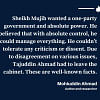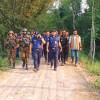The perils of protecting the image

On October 28, the foreign ministry presented the findings and recommendations of a report to its Parliamentary Standing Committee, assuring them that efforts were afoot to bring Bangladeshi expatriates involved in anti-government activities under the law. The report states that, despite their positive contributions such as sending remittances, "many (expatriates) are engaged in propaganda against Bangladesh and (the) government. The government is working to bring those to book who are engaged in anti-government activities and giving provocative and completely fabricated statements." An exasperated ruling party member of the standing committee observed that due to the continuous propaganda against the government, representatives of some EU countries had started to express negative attitudes towards our country. Echoing the MP's concerns, the foreign minister noted that in several European countries, "a syndicate is spreading propaganda against the country on (a) broader scale" while the chair of the parliamentary standing committee urged the Bangladesh missions to step up their efforts to nab "the culprits."
Such an approach to stem critics appears to be flawed on several counts. The amorphous concepts of "tarnish" and "image" provide a wide scope for subjective interpretation and abuse. The foreign ministry and MPs do not draw distinction between criticism of the government and the state. They give undue credence to detractors irrespective of the quality of content of the messages they convey. They also underestimate the people's intelligence and agency to draw a distinction between truth and propaganda.
In recent years, Bangladeshi expatriates have been increasingly expressing their views and concerns online, often questioning and challenging major political parties and their leaders about their policies and programmes. There is an enormous variation in the form, content and quality of such views: while a few are bold, revealing and meet high standards of investigative journalism, others descend into diatribes. Quite understandably, both streams create discomfort for those in positions of authority, a group groomed by and used to a pliant media at home.
Those in positions of authority feel that these expatriates are tarnishing the country's image at a time when the government has elevated the country to a dignified position, leading them to draw the conclusion that these expats are on BNP-Jamaat payroll "who do not believe in Bangladesh's independence" and thus are nothing but "enemies of the people of the country." Time and again, senior functionaries have announced their resolve to initiate actions against those "who resort to cybercrime to tarnish the image of the country abroad." In pursuing this agenda, they sought the support of Facebook and Youtube.
This fetish with the "image of the country" was stark when three groups of returnee migrant workers arriving from the Gulf states, Syria, Lebanon, and Vietnam were incarcerated soon after they finished their quarantine period. "Tarnishing the image of the country abroad" and "hatching conspiracy against the government and the state while in quarantine" were two principal charges against them. While the group that returned from the Gulf was comprised of migrants who were in detention for breaking laws in their destination country, the returnees from Syria and Lebanon were irregular migrants, and those returning from Vietnam were victims of human trafficking. All were in quarantine administered by the Bangladesh Army.
When the veracity of these charges were challenged at the High Court, the state had little option but to withdraw the charges in haste. In the process, the affected migrants had to spend weeks in Kashimpur jail in the midst of an existential crisis triggered by Covid-19. Till date, the state has failed to explain and offer apology to the wronged migrants, let alone hold into account those responsible for this reprehensible act.

The charge of tarnishing the country's image is not restricted to the expatriate migrant community alone. In a number of instances, opposition political parties and dissenting voices have been accused of doing so. Whenever opposition party or civic forum leaders express and convey their concerns about the shrinking democratic space to resident or visiting foreign diplomats, including the ones from UN special procedures, those acts are instantaneously labelled as "tarnishing the image of the country before the foreigners." The government claims that such moves contribute to daring the foreigners to make comments on our internal affairs.
In May 2020, faced with a series of abductions and killing, the government found it convenient to blame the opposition. The secretary of the ruling party observed that a certain quarter was conspiring to taint the image of the government, while his fellow minister, without providing any evidence, blamed BNP and Jamaat "for conspiring to topple the government by carrying out these incidents.". Likewise, in mid-October of 2021, when several Hindu temples were vandalised before the Durga Puja, the government announced that "such incidents were orchestrated intentionally so that Bangladesh's image is damaged."
While this fixation with "the image" in the political establishment is somewhat understandable, it is worrisome when the term finds takers among the senior most functionaries tasked to dispense justice and ensure rule of law. On March 7, 2021, the chief justice of Bangladesh, while passing a judgment, observed, "It should be kept in mind that we would give priority to the country's image first. We will not consider bail if the image of the country is tarnished through someone's writing." On March 8, 2021, while asserting his office's independence, the outgoing chair of the Anti-Corruption Commission admitted, "I had to refrain from taking some decisions during this period in order to protect the image of the country."
Perhaps the ruling elite's disdain for the rule of law and lack of respect for citizens' rights stem from their inability to make a distinction between the institution of the government and the institution of the state. Any criticism of the government is hence synonymised with hurting the country's image. In response, the government is engaged in criminalising freedom of expression by crafting powerful tools such as the Digital Security Act. Analyst Kamal Ahmed makes the point that the issue of the country's image has not been mentioned in the descriptions of offences against the state and seditious offences under the Code of Criminal Procedure.
Bangladeshis deserve a just, fair and equitable system of governance. While quite a few laws and administrative practices increasingly stifle freedom of expression, assembly and the right to organise, there is virtually no progress in holding the perpetrators of extrajudicial killing, involuntary disappearance and torture to account – chipping away the much coveted image of the country. Enhancing the country's image entails making tangible and dedicated efforts to address those cracks. Those at the helm must also acknowledge that it is the common masses' trust and confidence in the institution of the state that is the ultimate promoter of a country's image.
Dr CR Abrar is an academic and human rights expert.

 For all latest news, follow The Daily Star's Google News channel.
For all latest news, follow The Daily Star's Google News channel. 










Comments